What sort of noise do you make when you wake up? A tweet tweet or a hoo hoo? While some people wake up with the relentless tweeting energy of an early bird, you may feel a gradual arrival into the new day, slowly building up energy throughout the morning.
A morning person usually gets tired in the evenings, while a night owl feels more energised towards the end of the day. They also likely have trouble sleeping in past a certain time, as their body isn’t accustomed to a late start. Dr. Doga Ayish, a neurologist at Houston Methodist, has this to say on the matter:
“If you’re a morning person, your brain is most alert in the morning, and you’re generally very good at harnessing this energy and focus to get tasks, work, and chores done.”
However, just because you’re not a morning person, it doesn’t mean you’re being outperformed by your early rising counterparts. You just have a different circadian rhythm (our internal body clock that dictates energy levels). What’s more, while there are certainly some things you can do to turn yourself into more of a morning person if that’s what you wish, know that it is not easy. Our internal clock is rigid and hard to adjust.
If that’s you, and you want to change your routine, fear not. It isn’t impossible. I’ve done it myself – here are some of my insights.
Morning Ritual
You know it, the person commenting below knows it. Hell, everyone knows it. Human beings are creatures of habit. We crave routine, even if we don’t realise it. A series of regular events and actions help stabilise our often-frantic minds, providing a base of operations. In the morning, if you struggled to get going, the waking-up period can often feel like it lasts forever. This is why it’s a good idea to give your brain something to latch on to when it’s still finding its bearings. Here, your brain is settling in for the day. Instead of floating in the sleep-fuelled confusion, you’re cutting through the murky water and setting yourself up with a small win. And a win is always a win, no matter the size.
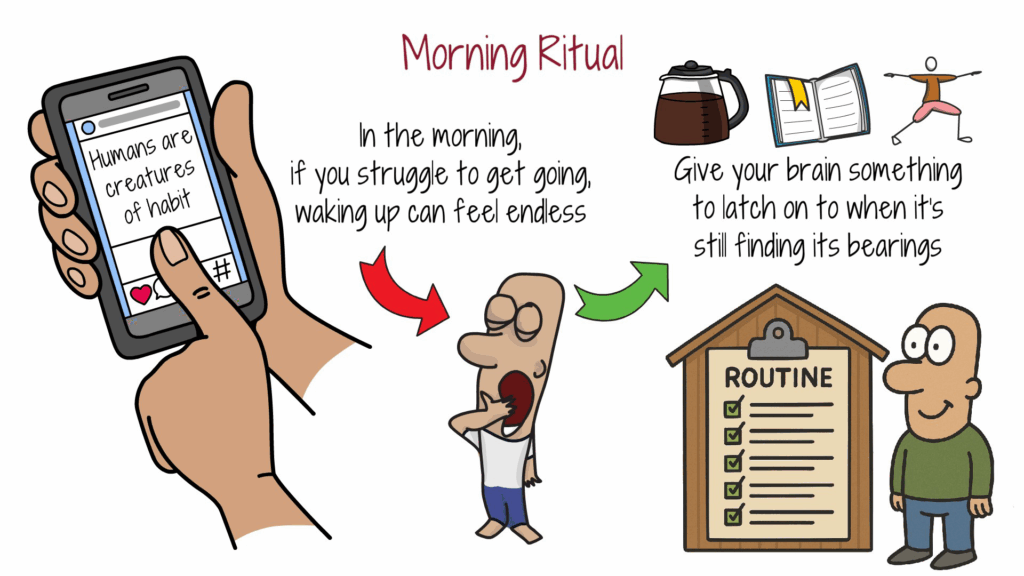
Remember, you want to keep this routine as simple as possible. After all, you’re still waking up and when you’re not used to that, pushing your brain to do too much can become frustrating. You could start with a tea ritual, just as I do every morning. The process of preparing a cup of loose-leaf tea (measuring the leaves, heating the water, infusing the leaves, removing the leaves) prevents mindless scrolling through emails or social media during low-willpower moments and helps me ease into the day with a more thoughtful energy.
If you don’t like tea, you could exercise – anything from a full workout to a quick stretch. This is great for getting the blood flowing and sustainably spiking your energy levels. You could also write – author Julia Cameron’s renowned book The Artist’s Way walks you through the structure and benefits of ‘morning pages’ – 3, uninterrupted streams of consciousness, every morning.
Put simply, you want to do anything that gets your blood flowing in a healthy manner, be it physical, mental, or both.
Bright Light Exposure
If you don’t think you will respond to gentle nurturing, perhaps a blunter method is for you. I’ve had success with quick exposure to bright light first thing in the morning. Immediately turning on all lights in the home signals the body to wake up, compensating for the lack of natural sunlight in early hours. If you’re enjoying summer, let the natural light burst into your room, signalling that it is well and truly time to be awake.

Alternatively, you could go outside for a short walk if it’s already light. Even if you’re the most reclusive of night owls, you’ll likely find that once you get started and your brain gets going, it’ll get easier. Think of it as a dip into a cold swimming pool. At first, the chill is somewhat overwhelming, but once your body regulates, it’s fine.
Purposeful Morning Activities
You may be thinking that carrying out purposeful morning activities is like a morning routine. In some ways, you’re right. But a morning routine is small in nature – repeated acts that become ingrained, encouraging the brain to wake up.
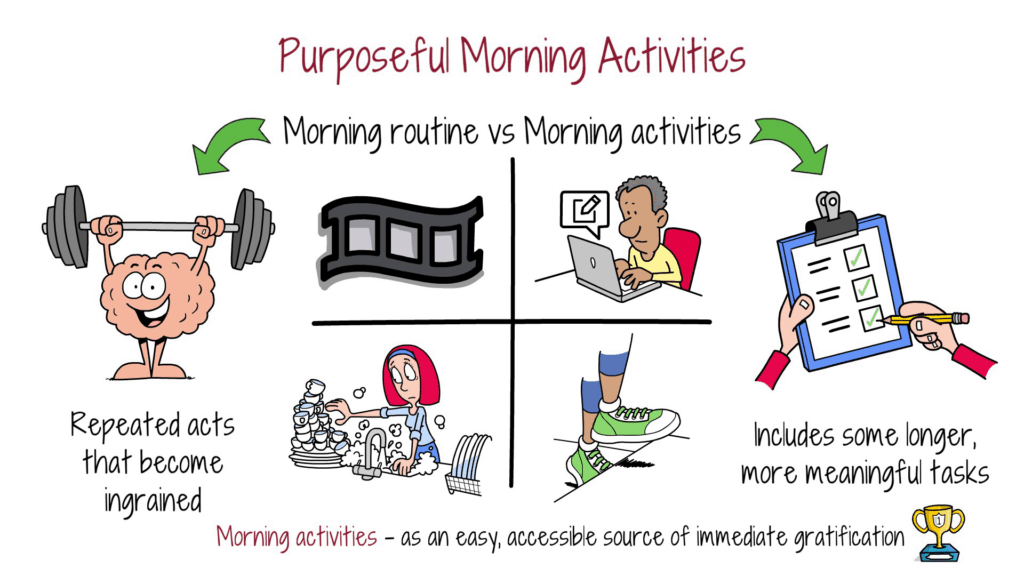
The brain absolutely craves routine, but it also loves feeling productive. There’s no rush quite like ticking items off your to-do list and getting things done. So, you could engage in some longer, more meaningful tasks. I’ve had success with morning writing, editing, exercising, or even household chores. It could be anything, really, but it provides motivation to get out of bed and start your day strongly.
Think of purposeful morning activities as an easy, accessible source of immediate gratification. As mentioned earlier, the sense of accomplishment that comes with productivity is not one to be underestimated. Grab those early wins.
Adjusting Evening Routine
It’s all well and good intending to wake up earlier than usual, do some writing and some exercise to start the day off with gusto. However, if you don’t prioritise sleep, none of that will be possible. The issue night owls will face is, when you reach the evening, it will likely feel like you’re stepping into a familiar, comfortable pair of slippers – soft on your feet, but perhaps too comfortable for your goals. In other words, adjusting your evening routine is as if you were laying out trainers for a morning run – ready to go.
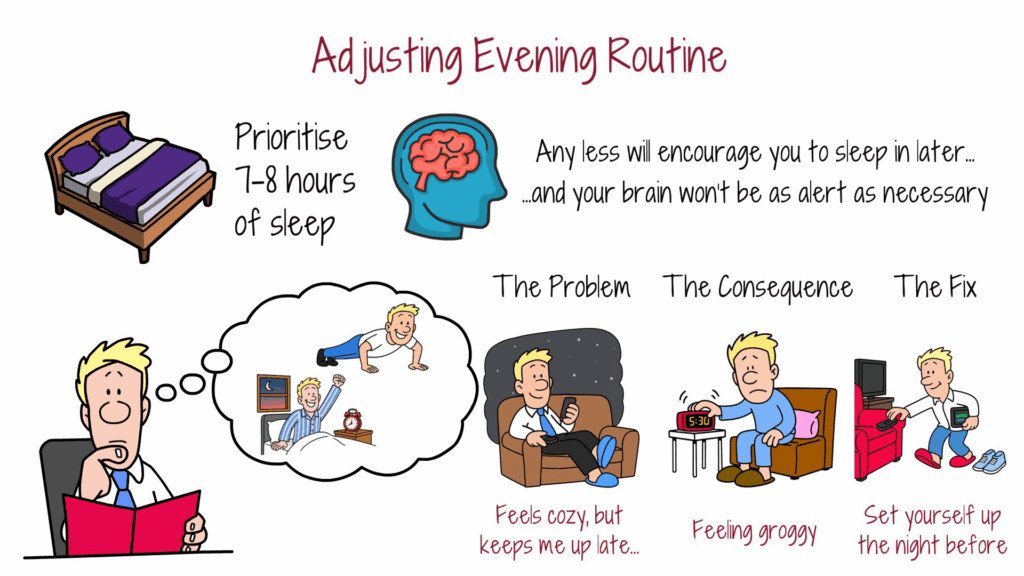
For starters, it’s important you prioritise and acknowledge the need for 7-8 hours of sleep. Any less will encourage you to sleep in later and slip into old habits, not to mention your brain will be starved of valuable rest so it won’t be as alert as necessary for a typically morning-shy person. To do this, it would be helpful to plan bedtime accordingly. I know, you’re not a kid anymore, but that’s just the thing – your parents set bedtimes to ensure you got a regulated amount of sleep. It’s easy to ignore that sense of discipline as an adult – after all, it’s your life, you should go to bed whenever you want. But it certainly has its place.
A good, and incredibly simple, place to start is setting a time you’d like to wake up and be in bed 8 and a half to 9 hours before, to account for winding down and shutting your brain off. For this, a ritual may be handy, such as dimming the lights and preparing the bedroom environment at a set time to signal to the body that it’s time to relax and prepare it for sleep. The less you do this, the more you’ll be tossing and turning in the night.
Adjust Sleep Schedule
Shifting your internal body clock to be more morning oriented is no mean feat. It’ll take time, patience, and a smattering of frustration. To account for this process, wake up earlier than usual in 15-minute increments. This will gradually adjust your body to your desired reality. Your circadian rhythm is potent and must change slowly, otherwise you’ll feel overly tired. For instance, if you wake up an hour earlier than usual, your body will likely reject the different time.
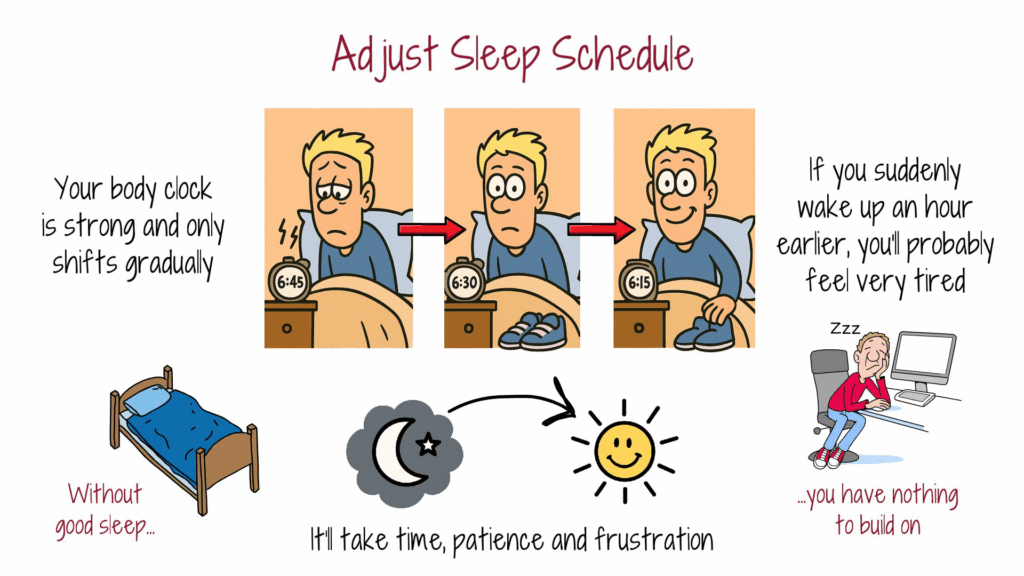
Remember – pivoting towards a more morning-oriented existence relies on your relationship with sleep. You can do whatever you like in the morning, but if your sleep isn’t taken care of, you don’t have a base to operate from.
Mornings Aren’t for Everyone, But They Could Be for You
Although there are many steps you can take to become a morning person, there are numerous factors that may not align with your desire. For example, your age, genes, general light exposure, and even mealtimes can affect how you feel bright and early. So, as we’ve discussed in this article, you ultimately need patience.
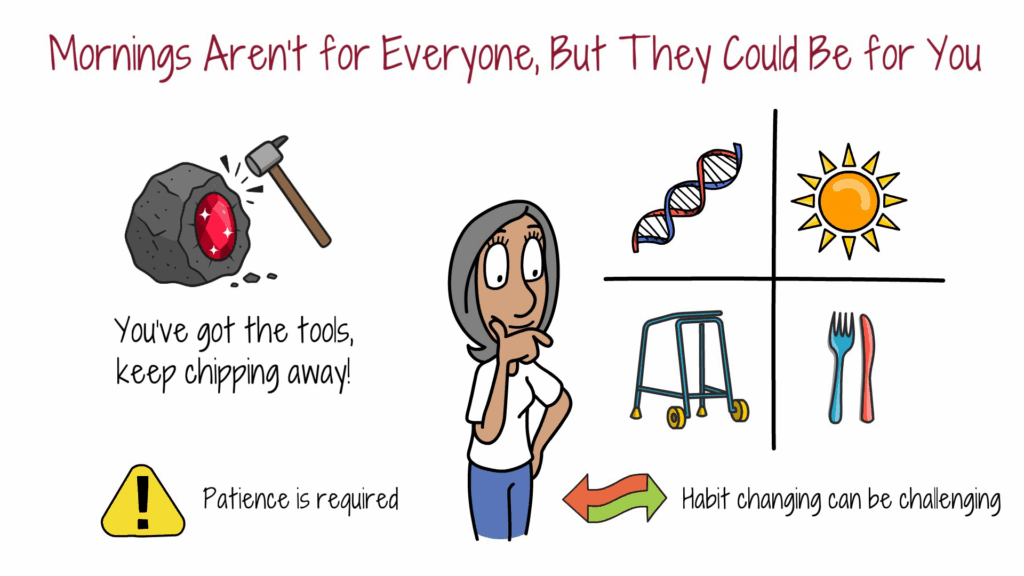
This process is habit changing. As habits are so ingrained in you to the point you don’t notice, they can prove challenging to change. So, give yourself some grace.
Above all, though, you should approach this shift in your base settings as if you’re mining for a shiny new rock. You’ve got the tools – now you just need to keep chipping away.
